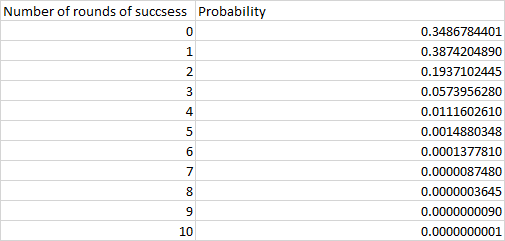I asked players to play a game where the outcome (number of successes) should be based on pure chance. However, players could cheat and increase their number of successes. Cheating is not actually a bad thing in my game, I am just using this word for ease of exposition. For each number of successes, I want to calculate the probability that the players with that number of successes cheated.
I will explain the game. Players chose 1 of 10 numbers for 10 rounds. Every round, only 1 of the 10 numbers means that a player is successful. So in each of the 10 rounds, a player has a 10% probability to be successful. Using Bernoulli's Trial I computed the expected probability of the total number of rounds in which a player will be successful. I post them in the table below.
In the data from the game, I can see that many players manage to be successful in all 10 rounds. Let's say that 20 out of 1,000 (2%) of players succeeded in all 10 rounds although, in expectation, only 0.0000001 players (1000 players * the probability that one player succeeds in all 10 rounds) should have succeeded in all 10 rounds. Can I calculate the probability that 20 out of 1,000 players succeeding in 10 rounds is due to cheating and not due to chance?
I want to calculate this number for each level of success. So, for example, 3 out of 1,000 (0.03%) players succeeded in 5 rounds although, in expectation, only 1.4880348 players (1000 players * the probability that one player succeeds in 5 rounds) should have succeeded in 5 rounds. So in general I want to know, for an actual number of players that succeeded for x rounds, what is the probability that their level of success is due to cheating and not due to chance?
I think I should not use a Binomial Test as presented here (https://www.randomservices.org/random/hypothesis/Bernoulli.html). This test, as I understand it, checks if the mean number of wins across all players is different than the expected mean number of wins.
Any help would be appreciated. Thank you.

